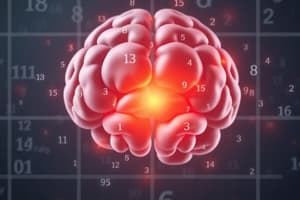Podcast
Questions and Answers
What is the concept introduced by Charles Spearman in his Two-Factor Theory?
What is the concept introduced by Charles Spearman in his Two-Factor Theory?
- General intelligence (g) and specific abilities (s) (correct)
- Fluid and crystallized intelligence
- Multiple intelligences
- Primary mental abilities
Which of the following is NOT one of the primary mental abilities proposed by Louis Thurstone?
Which of the following is NOT one of the primary mental abilities proposed by Louis Thurstone?
- Spatial visualization
- Short-term memory (correct)
- Inductive reasoning
- Verbal comprehension
According to Howard Gardner's Multiple Intelligences Theory, how many types of intelligence are proposed?
According to Howard Gardner's Multiple Intelligences Theory, how many types of intelligence are proposed?
- 8
- 7
- 5
- 9 (correct)
What is the term for the ability to reason and solve novel problems, according to Raymond Cattell's theory?
What is the term for the ability to reason and solve novel problems, according to Raymond Cattell's theory?
Which of the following is an additional factor proposed by John Horn's Expanded Theory?
Which of the following is an additional factor proposed by John Horn's Expanded Theory?
What is the main idea behind the Triarchic Theory of Intelligence proposed by Sternberg?
What is the main idea behind the Triarchic Theory of Intelligence proposed by Sternberg?
Which of the following theories proposes that intelligence is composed of a general factor and specific factors?
Which of the following theories proposes that intelligence is composed of a general factor and specific factors?
What is the name of the theory that proposes seven primary mental abilities?
What is the name of the theory that proposes seven primary mental abilities?
Which of the following is a type of intelligence proposed by Howard Gardner's theory?
Which of the following is a type of intelligence proposed by Howard Gardner's theory?
What is the term for the ability to use learned knowledge and experience, according to Raymond Cattell's theory?
What is the term for the ability to use learned knowledge and experience, according to Raymond Cattell's theory?
Flashcards are hidden until you start studying
Study Notes
Classical Theories of Intelligence
Charles Spearman's Two-Factor Theory
- Introduced the concept of general intelligence (g) and specific abilities (s)
- g: a general factor that accounts for overall cognitive ability
- s: specific factors that account for individual differences in specific abilities
Louis Thurstone's Primary Mental Abilities
- Proposed seven primary mental abilities:
- Verbal comprehension
- Verbal fluency
- Number facility
- Spatial visualization
- Perceptual speed
- Inductive reasoning
- Memory
Howard Gardner's Multiple Intelligences Theory
- Proposed nine types of intelligence:
- Linguistic intelligence
- Logical-mathematical intelligence
- Spatial intelligence
- Bodily-kinesthetic intelligence
- Musical intelligence
- Interpersonal intelligence
- Intrapersonal intelligence
- Naturalistic intelligence
- Existential intelligence
Raymond Cattell's Fluid and Crystallized Intelligence
- Fluid intelligence (Gf): the ability to reason and solve novel problems
- Crystallized intelligence (Gc): the ability to use learned knowledge and experience
John Horn's Expanded Theory
- Expanded Cattell's theory by adding more factors:
- Visual-spatial ability
- Auditory ability
- Speed of processing
- Correct decision speed
- Short-term memory
- Long-term storage and retrieval
Triarchic Theory of Intelligence (Sternberg)
- Three components of intelligence:
- Analytical intelligence: the ability to evaluate and analyze information
- Creative intelligence: the ability to generate new ideas
- Practical intelligence: the ability to apply knowledge in real-world situations
Studying That Suits You
Use AI to generate personalized quizzes and flashcards to suit your learning preferences.




